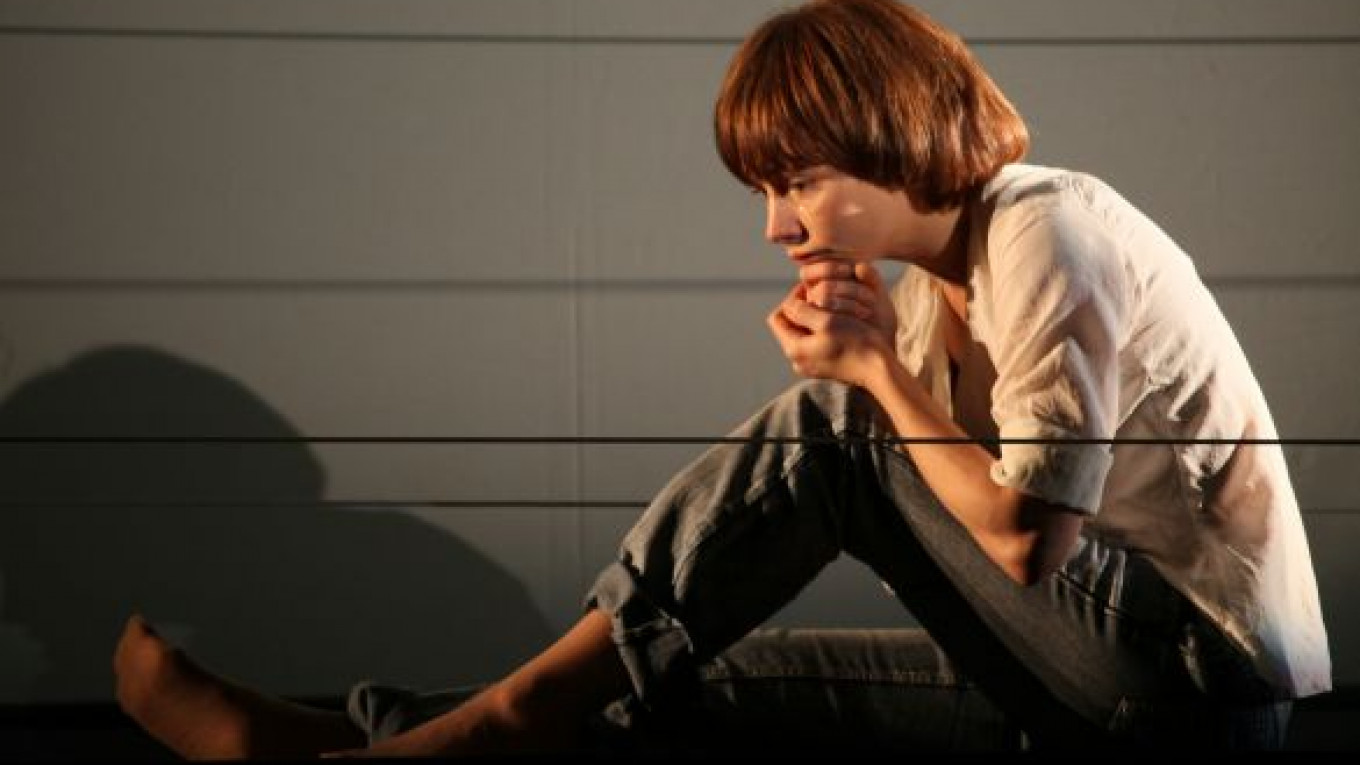Yelena Chizhova is a fascinating figure in recent Russian letters. She debuted as a novelist in 2000 in her early 40s and by the end of the decade had won the Russian Booker Prize.
I’m a strong believer in admitting ignorance, so I readily admit to lacking this knowledge until I recently had the good fortune to find myself sitting in the hall of the Drugaya stage of the Sovremennik Theater. I was there to see “A Time of Women,” based on the novel for which Chizhova was awarded the Russian Booker.
The director and adapter of the novel was also new to me. Yegor Peregudov is a relatively recent graduate of Sergei Zhenovach’s directing course at the Russian Academy of Theater Arts. He debuted in 2009 with a play called “Push Up 1-3” at the National Youth Theater.
I see now why Live Theater-2010 named him best new wave director for that production, which — gulp! — I also missed.
“A Time of Women” takes us on an intimate, deeply personal journey through several eras of Soviet and Russian history. It focuses largely on Antonina, a woman who achieved maturity in the 1950s, and her daughter Suzanna, who became a successful painter decades after that. But it also never strays far from three elderly women, with whom Antonina lived, and who enriched the lives of her and her daughter.
Through these women we come to understand better the impact that the 20th century had on individual Russians. Echoes of the Russian Revolution, moribund Soviet bureaucracy, the advent of television, and world events like the Hungarian revolt in 1956 interweave with love affairs old and new, a pregnancy, a fatal illness and the efforts of the elderly women to care for Suzanna when it appears that she will be sent to an orphanage.
Designer Maria Mitrofanova created a laconic but expressive set consisting of an oven, a kitchen table and a sink standing forlornly in the wide expanses of a black box. Cleverly, she painted footpaths onto the floor, which the actors almost invariably use as they move from one place to another. The implication — that people are creatures of habit, repeating the same things over and over again — is both clear and subtle.
A large screen behind a walkway above the stage has multiple purposes. It can be one of Suzanna’s canvases, it can be a television screen, or it can be a place representing imagination as shadow scenes are projected on it from the table below.
Alyona Babenko is superb as both Antonina and Suzanna. As the former she has a folksy simplicity about her, a down-home warmth that easily justifies the love the older women have for her. As Suzanna she is wise and wistful, sensitive to her memories of her mother and the old women who raised her after her mother died.
For much of the show Peregudov keeps Babenko downstage, within arm’s reach of the audience. It’s a shrewd move. The actress’s charm, her endearing clumsiness and the warmth that emanates from her eyes keep the human element of this show on display at every moment.
What we witness are snippets of lives, scenes jumping back and forth decades at a time.
Antonina conceives her child one night following a chance romantic encounter with a proverbial dark, mysterious man (Yevgeny Matveyev). Later efforts to marry her off to a nice-enough bumpkin (Sergei Girin) take forever to develop. Interference in Antonina’s life from a local Communist Party official (Inna Timofeyeva) is sometimes helpful, but more often a terrible hindrance.
Antonina’s joys and, more frequently, her sorrows are shared by the old women she lives with in a communal apartment — the gruff Yevdokia (Svetlana Korkoshko), the childlike Glikeria (Lyudmila Krylova) and the bookish Ariadna (Taisia Mikholap). Their memories, their stories and their attitudes to friends, enemies and the world establish a rich, nuanced background for Antonina’s own story to unfold.
Romantic encounters between Antonina and Grigory, and Glikeria and her long-lost sweetheart Solomon Zakharovich (Rogvold Sukhoverko) are handled in a way that makes them half-real and half-imagined. They are encounters that are every bit as sweet as they are bitter.
“A Time of Women” runs somewhat long (nearly 3 1/2 hours) for a small stage show. There are moments when one feels that Peregudov wanted to incorporate Chizhova’s every word and nuance.
That, however, is a small imperfection in such a rich, beautifully conceived and well-acted evening of theater.
“A Time of Women” (Vremya Zhenshchin) plays Sunday at 7:30 at the Sovremennik Theater, Drugaya stage, located at 19 Chistoprudny Bulvar. Metro Chistiye Prudy. Tel. 621-6473, . Running time: 3 hours, 20 minutes.
A Message from The Moscow Times:
Dear readers,
We are facing unprecedented challenges. Russia's Prosecutor General's Office has designated The Moscow Times as an "undesirable" organization, criminalizing our work and putting our staff at risk of prosecution. This follows our earlier unjust labeling as a "foreign agent."
These actions are direct attempts to silence independent journalism in Russia. The authorities claim our work "discredits the decisions of the Russian leadership." We see things differently: we strive to provide accurate, unbiased reporting on Russia.
We, the journalists of The Moscow Times, refuse to be silenced. But to continue our work, we need your help.
Your support, no matter how small, makes a world of difference. If you can, please support us monthly starting from just $2. It's quick to set up, and every contribution makes a significant impact.
By supporting The Moscow Times, you're defending open, independent journalism in the face of repression. Thank you for standing with us.
Remind me later.







